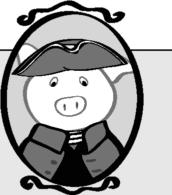Politically Incorrect Guide To The Constitution (Politically Incorrect Guides) (3 page)
Read Politically Incorrect Guide To The Constitution (Politically Incorrect Guides) Online
Authors: Kevin R. C. Gutzman

At first, arguments against Parliament's taxing the colonies were presented in a conciliatory way. After all, the colonists were British and enthusiastically patriotic. It was only yesterday that they had won the
first world war against Britain's most powerful rival. They were persuaded that the unwritten British constitution was the world's finest.
They had defeated papist France, with its absolute monarchy, because
they were free-and, many believed, because God favored their Protestant nation.

Holy Pistole!
In 1752, Lieutenant Governor Robert Dinwiddie tried to charge a pistole-a coin valued at a little
more than one English pound-for signing any land patent. The governor's signature had always
been required, but no governor had ever tried to charge for it. Virginians were outraged and created the slogan "Liberty, Property, and No Pistole" in protest. Dinwiddie claimed that the pistole
fee was his prerogative as the king's representative, but the people argued that it was a tax on
them without the consent of their elected representatives in the General Assembly. Dinwiddie
said the colonists were "much inflam'd...with republican Principles" and wondered if they were
becoming a threat to his royal authority because they had been allowed to govern themselves for
too long.'
But the colonists would not pay taxes to a Parliament they had not
elected. They protested, they boycotted, they bullied representatives of
the Crown, and they organized a congress, the Stamp Act Congress, to
speak formally for them. But the British, for their part, would not respond
to the Congress. King George III believed that the colonies must be either
subject to the King-in-Parliament or independent; he would make them
comply.
In the course of the 1760s and 1770s, Britain sent home New York's
legislature, reorganized Massachusetts's government, closed Boston's
port, restricted access to trial by jury, and adopted various other laws
intended to make it easier to tax the colonists. The colonists' response
was a more and more heartfelt "No!"
In Virginia, a young member of the House of Burgesses named Patrick
Henry offered his colleagues a set of resolutions. He wanted the elected
representatives of America's most important colony to go on record in
opposition to the Stamp Act of 1765-a British tax measure-and he
wanted them to do it in a radical way.
Henry's resolutions against the Stamp Act, later known as the Virginia
Stamp Act Resolves, said that Virginians had always had, from their
colony's settlement, "all the privileges and immunities" of "the people of
Great Britain." Virginia's two royal charters of the seventeenth century,
Henry pointed out, had made that guarantee. Moreover, Virginians had always "enjoyed the right of being thus governed by their own Assembly
in the article of taxes and internal police."
Henry would have had the Burgesses resolve that "the General Assembly of this colony, together with his Majesty... have ... the only exclusive
right and power to lay taxes and imposts upon the inhabitants of this
colony; and that every attempt to vest such power in any other person or
persons whatever... is illegal, unconstitutional, and unjust, and has a
manifest tendency to destroy British as well as American freedom."
Along this same line, he insisted that "his Majesty's liege people, the
inhabitants of this colony, are not bound to yield obedience to any law or
ordinance whatever, designed to impose any taxation whatsoever upon
them, other than the laws or ordinances of the General Assembly aforesaid." His final proposed resolution held that "any person who shall, by
speaking or writing, assert or maintain that any person or persons, other
than the General Assembly of this colony, have any right or power to
impose or lay any taxation on the people here, shall be deemed an enemy
to his Majesty's colony."
This was stern stuff. To be recognized as an
enemy to the colony opened the door to punishment for treason. Clearly, Patrick Henrywho would dominate Virginia politics for
decades to come-believed that Virginians'
chief right was the right to govern themselves
through their General Assembly. Yet his was
still a minority position in America, even
among Virginia's political elite.
What a
Patriot Said

"Let those flatter who
fear, it is not an
American art."
Thomas Jefferson,
A Summary View of the
Rights of British America
Reflecting most colonists' hope for reconciliation, the Stamp Act Congress of 1765
adopted far more restrained language. Led by
Pennsylvania's conservative statesman John Dickinson, the Congress
began by saying that the congressmen (from nine of the colonies) loved the king and his family. Next, they said that the colonists had all the
duties of Englishmen. Only then did they get around to insisting that they
had the rights of Englishmen. After explaining that they insisted on traditional English rights, including the right to be taxed only by their own
representatives, this first American congress closed by saying that the
resolves had been adopted out of duty, to call to the king's attention a
budding threat to the British constitution.
In the wake of colonial boycotts, intimidation of stamp agents, and formal protests, the British repealed the Stamp Act in 1766. They then
passed a new law, the Declaratory Act, in which they claimed authority
to legislate for the colonies "in all cases whatsoever."
Britain's Parliament here followed the line of thinking laid out by the
all-time leading British legal scholar, Sir William Blackstone. In his fourvolume 1765 book, Commentaries on the Laws of England, Blackstone
explained a concept called "sovereignty."
In every society, Blackstone wrote, there must be a sovereign. It could
be an individual, a committee, an assembly, or any other type of organization, but there had to be one. That sovereign had ultimate authorityits decisions were final. It had to be unitary-its power could not be
shared or limited in any way. And in the British Empire, that sovereign
was Parliament.
In the Declaratory Act, then, Parliament did not claim anything new.
In England, if you favored liberty, you favored parliamentary sovereignty.
The historical alternative, after all, had been royal sovereignty, and
Britain's constitution had resolved against it.
In 1774, a Virginia planter named Thomas Jefferson spelled out the
colonists' position in very fiery language. It followed a decade of contention between Parliament and the colonists, a decade marked by increasingly ham-fisted British measures like the Coercive Acts against
Massachusetts and increasingly pugnacious responses by a growing
American opposition.
Jefferson's pamphlet came to be known as A Summary View of the
Rights of British America. Building on a tradition of insistence on local
self-government peculiar to Virginia, and borrowing especially from his
mentor in constitutional matters, Richard Bland, Jefferson flung the
gauntlet at King George's feet.
You, King George, he said, are merely a functionary put in your office
for our good, "no more than the chief officer of the people." And if you
ever ceased to serve our purposes, we would be justified in replacing you.
"Let those flatter who fear," Jefferson said, "it is not an American art."
According to Jefferson's version of colonial history, the colonies in
North America had been founded by Britons exercising their natural right
to emigrate. Once they had emigrated to a land still unsettled, they had
had a right to establish new civil societies. The British Empire, Jefferson
claimed, could be a happy one if its constituent parts-the various dominions-were kept in balance. Only the king was in a position to
ensure that that happened. As Jefferson had it, each part of the EmpireConnecticut, Virginia, Great Britain, Jamaica, and so on-had its own
local legislature. The only political institution they had in common was
the Crown: their common monarch, George III.
Portrait of a Patriot

Thomas Jefferson (1743-1826) was the clearest expositor among leading figures
of the original understanding of the Constitution. Jefferson did not participate
in drafting or ratifying the Constitution, except insofar as he influenced James
Madison to agree to work for a bill of rights in the first Congress. Yet his 1791 memorandum to President George Washington regarding the constitutionality of the Bank Bill laid out the most cogent of
arguments in favor of a respectful (opponents say "strict") construction of constitutional language,
and his 1798 Kentucky Resolutions summarized the state sovereignty version of the Constitution in
its most powerful form. Jefferson's 1801 electoral triumph swept his Republicans into power for a
quarter-century and more, on the basis, he said, of the state sovereignty position!
In case the legislature of one part of the Empire should try to coerce
another part of the Empire into surrendering some of its rights, Jefferson
said, it was incumbent upon King George to intervene. He could veto Parliament's legislation if it violated colonists' rights, and Jefferson seemed
to be threatening the king to act on the colonists' behalf.
A federation of independent states
Jefferson's vision of the British Empire in 1774 featured a strong federal
element; that is, to his way of thinking there was no national government
ruling the whole Empire, but instead provincial assemblies in each of the
king's dominions. In reference to the British Parliament's suspension of
New York's assembly, Jefferson referred to the latter as a "free and independent legislature" and equated it in that sense to Parliament.
And what was Parliament? According to Jefferson, it was "a body of
men foreign to our constitutions, and unacknowledged by our laws."
George III maintained a common foreign and defense policy for the
Empire. But in matters of local import, the people, through their elected
assemblies, should rule themselves.
In common with other educated men of the eighteenth century, Jefferson was well versed in the classical Greek and Latin authors. For him, as
for the Greeks, freedom was local self-government. He closed his Summary View with the claim that "the god who gave us life gave us liberty
at the same time; the hand of force may destroy, but cannot disjoin them." George III should "interpose ... to establish fraternal love and harmony
thro' the whole empire."
How did the king respond? He never accepted the American colonists'
constitutional claims. He subscribed instead to the theory described by
Blackstone in 1765: Parliament was sovereign throughout the Empire,
which meant that its authority could not be limited or divided. The
colonists might insist that Britain's constitution did not grant Parliament
the power to tax them or deprive them of the right to trial by jury, but the
king held that Parliament could legislate for everyone in the British
Empire "in all cases whatsoever." Parliamentary sovereignty left no room
for an assertion of individual or colonial rights.